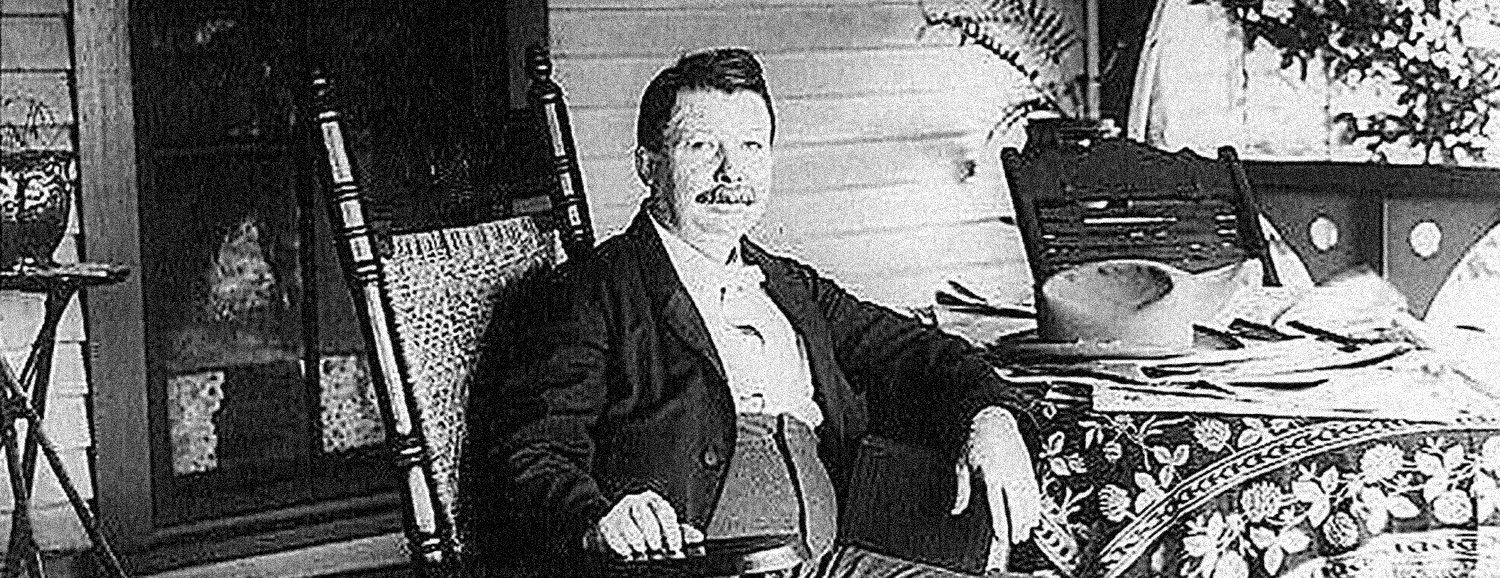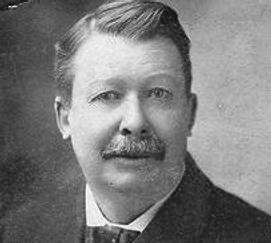Joel Chandler Harris is best known for preserving the Brer Rabbit folktales in the Uncle Remus series. Harris was born in Barnes Inn and Tavern in downtown Eatonton, Georgia in 1845.
As a student, he was teased by his classmates for his stutter, red hair, and short stature. At 15 years-old Harris became a typesetter for The Countryman newspaper and worked at Turnwold Plantation, just outside of Eatonton. Plantation owner, Joseph Turner, tutored Harris in literature and journalism, while the enslaved peoples taught him the life lessons rooted in the Brer Rabbit tales.
Harris worked for newspapers across the state, eventually making his way as an editor at the Atlanta Constitution. His writings were praised for their humor, and he became a world-renowned author.
Harris published 185 stories during his lifetime. He passed away on July 3, 1908 at his home, The Wren’s Nest, in Atlanta, Georgia.
Virtual Mini Tour
Click on the links below!
Awards
- Elected to Academy of Arts and Letters (1905)
- Honorary doctorate in literature from Emory College and University of Pennsylvania (1902)
- U.S. Post Office issues the Joel Chandler Harris stamp (1948)
- Inducted into the Georgia Writers Hall of Fame (2000)
Resources
- The Life and Letters of Joel Chandler Harris by Julia Collier Harris (1918)
- Joel Chandler Harris: A Biography by Paul M. Cousins (1968)
- Dearest Chums and Partners: Joel Chandler Harris’ Letters to his Children edited by Hugh Keenan (1993)
- Brer Rabbit, Uncle Remus, and the ‘Cornfield Journalist’ by Walter Brasch (2000)
Works
Short Fiction
- “Jacky-My-Lantern” (1880)
- A Case of Measles (1880)
- A Confession (1880)
- A Plantation Witch (1880)
- A Story About the Little Rabbits (1880)
- A Story of the War (1880)
- A Temperance Reformer (1880)
- As a Murderer (1880)
- As a Weather Prophet (1880)
- As to Education (1880)
- His Practical View of Things (1880)
- How Mr. Rabbit Lost His Fine Bushy Tail (1880)
- How Mr. Rabbit Saved His Meat (1880)
- How Mr. Rabbit Succeeded in Raising a Dust (1880)
- How Mr. Rabbit Was Too Sharp for Mr. Fox (1880)
- In the Role of a Tartar (1880)
- Jeems Rober’son’s Last Illness (1880)
- Miss Cow Falls a Victim to Mr. Rabbit (1880)
- Mr. Bear Catches Old Mr. Bull-Frog (1880)
- Mr. Fox and the Deceitful Frogs (1880)
- Mr. Fox Gets Into Serious Business (1880)
- Mr. Fox Goes A-Hunting, But Mr. Rabbit Bags the Game (1880)
- Mr. Fox Is “Outdone” by Mr. Buzzard (1880)
- Mr. Fox Is Again Victimized (1880)
- Mr. Fox Tackles Old Man Tarrypin (1880)
- Mr. Rabbit and Mr. Bear (1880) also appeared as:
- Variant: Brer Rabbit and Brer Bear (1931)
- Mr. Rabbit Finds His Match at Last (1880)
- Mr. Rabbit Grossly Deceives Mr. Fox (1880)
- Mr. Rabbit Meets His Match Again (1880)
- Mr. Rabbit Nibbles Up the Butter (1880)
- Mr. Terrapin Appears Upon the Scene (1880)
- Mr. Terrapin Shows His Strength (1880)
- Mr. Wolf Makes a Failure (1880) also appeared as:
- Variant: Brer Wolf Makes a Mistake (1880)
- Old Mr. Rabbit, He’s a Good Fisherman (1880)
- Race Improvement (1880)
- That Deceitful Jug (1880)
- The Awful Fate of Mr. Wolf (1880) also appeared as:
- Variant: The Awful Fate of Brer Wolf (1880)
- The Emigrants (1880)
- The End of Mr. Bear (1880)
- The Fate of Mr. Jack Sparrow (1880) also appeared as:
- Variant: The Fate of Little Jack Sparrow (1880)
- The Florida Watermelon (1880)
- The Fourth of July (1880)
- The Old Man’s Troubles (1880)
- The Phonograph (1880)
- The Sad Fate of Mr. Fox (1880)
- The Story of the Deluge, and How It Came About (1880)
- The Wonderful Tar-Baby Story (1880) also appeared as:
- Variant: Uncle Remus and the Wonderful Tar-Baby Story (2015)
- Turnip Salad as a Text (1880)
- Uncle Remus (excerpts) (1880)
- Uncle Remus and the Savannah Darkey (1880)
- Uncle Remus Initiates the Little Boy (1880)
- Uncle Remus Preaches to a Convert (1880)
- Uncle Remus with the Toothache (1880)
- Uncle Remus’s Church Experience (1880)
- Why Mr. Possum Has No Hair on His Tail (1880)
- Why Mr. Possum Loves Peace (1880)
- Why the Negro Is Black (1880)
- A Ghost Story (1883)
- The Man and His Boots (1892)
- A French Tar-Baby (1893)
- “Keen-Point,” “Cob-Handle,” and “Butch” (1894)
- A Singing-Match (1894)
- A Story of the River (1894)
- Brother Terrapin’s Fiddle-String (1894)
- How Brother Bear’s Hair Was Combed (1894)
- Mr. Rabbit as a Rain-Maker (1894)
- Mr. Thimblefinger’s Friends (1894)
- Mr. Thimblefinger’s Queer Country (1894)
- Mrs. Meadows Resumes Her Story (1894)
- The Bewitched Huntsman (1894)
- The Grandmother of the Dolls (1894)
- The Ladder of Lions (1894)
- The Strawberry-Girl (1894)
- The Talking-Saddle (1894)
- The Talking-Saddle and the Thief (1894)
- The Three Ivory Bobbins (1894)
- The Witch of the Well (1894)
- Two Queer Stories (1894)
- Aaron Sees the Signal (1897)
- Between Midnight and Dawn (1897)
- Chunky Riley Sees a Queer Sight (1897)
- Prelude (Aaron in the Wildwoods) (1897)
- The Apparition the Fox Hunters Saw (1897)
- The Happenings of a Night (1897)
- The Hunt Begins (1897)
- The Hunt Ends (1897)
- The Little Master (1897)
- The Little Master Says Good Night (1897)
- The Problem That Timoleon Presented (1897)
- The Secrets of the Swamp (1897)
- The Upsetting of Mr. Gossett (1897)
- What Chunky Riley Saw and Heard (1897)
- What the Patrollers Saw and Heard (1897)
- The Late Mr. Watkins of Georgia (1898)
- Brother Rabbit’s Cradle (1905)
- Brer Rabbit (1945)
- Brer Rabbit and the Spewter Slutter Ghost (1966) [only as by Joel C. Harris]
Essays
- Introduction (The Complete Tales of Uncle Remus) (1880)
- Introduction (Uncle Remus: His Songs and His Sayings) (1880)
- Plantation Proverbs (1880)
- Preface and Dedication to the New Edition (The Tales from Uncle Remus: His Songs and His Sayings) (1896) also appeared as:
- Variant: Preface and Dedication to the New Edition (Uncle Remus: His Songs and His Sayings) (1921)
Collections
- The Tales from Uncle Remus: His Songs and His Sayings (1880) also appeared as:
- Variant: Uncle Remus: His Songs and His Sayings (1895)
- Variant: Uncle Remus: His Songs and Sayings (2018)
- The Tales from Nights with Uncle Remus: Myths and Legends of the Old Plantation (1883)
- The Tales from Daddy Jake the Runaway, and Short Stories Told After Dark (1889)
- The Tales from Uncle Remus and His Friends: Old Plantation Stories, Songs, and Ballads with Sketches of Negro Character (1892)
- Little Mr. Thimblefinger and His Queer Country: What the Children Saw and Heard There (1894)
- Mr. Rabbit at Home: A Sequel to Little Mr. Thimblefinger and His Queer Country (1895)
- The Story of Aaron (So Named), the Son of Ben Ali: Told by His Friends and Acquaintances (1896)
- Aaron in the Wildwoods (1897)
- The Tales from Told by Uncle Remus: New Stories of the Old Plantation (1905)
- The Tales from Uncle Remus and Brer Rabbit (1907)
- The Tales of Uncle Remus and the Little Boy (1910)
- The Tales from Uncle Remus Returns (1918)
- The Complete Tales of Uncle Remus (2002)
Poetry
- A Plantation Chant (1880)
- A Plantation Serenade (1880)
- Camp-Meeting Song (1880)
- Christmas Play-Song (1880)
- Corn-Shucking Song (1880)
- Plantation Play-Song (1880)
- Revival Hymn (1880)
- The Big Bethel Church (1880)
- The Plough-Hands’ Song (1880)
- Time Goes by Turns (1880)
Chapbooks
- Brer Rabbit (1945)



